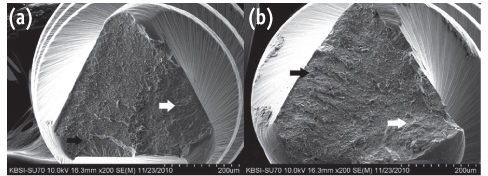Restor Dent Endod.
2012 May;37(2):79-83.
Effect of internal stress on cyclic fatigue failure in .06 taper ProFile
- Affiliations
-
- 1Department of Conservative Dentistry, Gangneung-Wonju National University School of Dentistry, Gangneung, Korea. drendo@gwnu.ac.kr
Abstract
OBJECTIVES
The purpose of this study was to evaluate the relation between intentionally induced internal stress and cyclic fatigue failure of .06 taper ProFile.
MATERIALS AND METHODS
Length 25 mm, .06 taper ProFile (Dentsply Maillefer), and size 20, 25, 30, 35 and 40 were used in this study. To give the internal stress, the rotary NiTi files were put into the .02 taper, Endo-Training-Bloc (Dentsply Maillefer) until auto-stop by torque controlled motor. Rotary NiTi files were grouped by the number of induced internal stress and randomly distributed among one control group and three experimental groups (n = 10, Stress 0 [control], Stress 1, Stress 2 and Stress 3). For cyclic fatigue measurement, time for separation of the rotary NiTi files was recorded. The fractured surfaces were observed by field emission scanning electron microscope (FE-SEM, SU-70, Hitachi). The time for separation was statistically analyzed using two-way ANOVA and post-hoc Scheffe test at 95% level.
RESULTS
In .06 taper ProFile size 20, 25, 30, 35 and 40, there were statistically significant difference on time for separation between control group and the other groups (p < 0.05).
CONCLUSION
In the limitation of this study, cyclic fatigue failure of .06 taper ProFile is influenced by internal stress accumulated in the files.
Keyword
Figure
Reference
-
1. Walia HM, Brantley WA, Gerstein H. An initial investigation of bending and torsional properties of Nitinol root canal files. J Endod. 1988. 14:346–351.
Article2. Ayar LR, Love RM. Shaping ability of ProFile and K3 rotary Ni-Ti instruments when used in a variable tip sequence in simulated curved root canals. Int Endod J. 2004. 37:593–601.
Article3. Al-Sudani D, Al-Shahrani S. A comparison of the canal centering ability of ProFile, K3 and RaCe Nickel Titanium rotary systems. J Endod. 2006. 32:1198–1201.
Article4. Canalda-Sahli C, Brau-Aguadé E, Berástegui-Jimeno E. A comparison of bending and torsional properties of K-files manufactured with different metallic alloys. Int Endod J. 1996. 29:185–189.
Article5. Haapasalo M, Udnæs T, Endal U. Persistent, recurrent, and acquired infection of the root canal system post-treatment. Endod Topics. 2003. 6:29–56.
Article6. Parashos P, Messer HH. Rotary NiTi instrument fracture and its consequences. J Endod. 2006. 32:1031–1043.
Article7. Sattapan B, Nervo GJ, Palamara JE, Messer HH. Defects in rotary nickel-titanium files after clinical use. J Endod. 2000. 26:161–165.
Article8. Ullmann CJ, Peters OA. Effect of cyclic fatigue on static fracture loads in ProTaper nickel-titanium rotary instruments. J Endod. 2005. 31:183–186.
Article9. Peters OA. Current challenges and concepts in the preparation of root canal systems: a review. J Endod. 2004. 30:559–567.
Article10. Parashos P, Gordon I, Messer HH. Factors influencing defects of rotary nickel-titanium endodontic instruments after clinical use. J Endod. 2004. 30:722–725.
Article11. Park SH, Seo HW, Hong CU. An evaluation of rotational stability in endodontic electronic motors. J Korean Acad Conserv Dent. 2010. 35:246–256.
Article12. Berutti E, Negro AR, Lendini M, Pasqualini D. Influence of manual preflaring and torque on the failure rate of ProTaper rotary instruments. J Endod. 2004. 30:228–230.
Article13. Li UM, Lee BS, Shih CT, Lan WH, Lin CP. Cyclic fatigue of endodontic nickel titanium rotary instruments: static and dynamic tests. J Endod. 2002. 28:448–451.
Article14. Schneider SW. A comparison of canal preparations in straight and curved root canals. Oral Surg Oral Med Oral Pathol. 1971. 32:271–275.
Article15. Plotino G, Grande NM, Cordaro M, Testarelli L, Gambarini G. A review of cyclic fatigue testing of nickel-titanium rotary instruments. J Endod. 2009. 35:1469–1476.
Article16. Bahia MG, Martins RC, Gonzalez BM, Buono VT. Physical and mechanical characterization and the influence of cyclic loading on the behaviour of nickel-titanium wires employed in the manufacture of rotary endodontic instruments. Int Endod J. 2005. 38:795–801.
Article17. Yared G, Kulkarni GK, Ghossayn F. An in vitro study of the torsional properties of new and used K3 instruments. Int Endod J. 2003. 36:764–769.
Article18. Lee JK, Kim ES, Kang MW, Kum KY. The effect of surface defects on the cyclic fatigue fracture of HEROShaper Ni-Ti rotary files in a dynamic model: a fractographic analysis. J Korean Acad Conserv Dent. 2007. 32:130–137.
Article19. Yared GM, Dagher FE, Machtou P, Kulkarni GK. Influence of rotational speed, torque and operator proficiency on failure of Greater Taper files. Int Endod J. 2002. 35:7–12.
Article20. Yared GM, Bou Dagher FE, Machtou P. Influence of rotational speed, torque and operator's proficiency on ProFile failures. Int Endod J. 2001. 34:47–53.
Article21. Kim TO, Lee CJ, Kim BM, Park JK, Hur B, Kim HC. Stress distribution of three NiTi rotary files under bending and tortional conditions using 3-dimensional finite element analysis. J Korean Acad Conserv Dent. 2008. 33:323–331.
Article22. Camps JJ, Pertot WJ. Machining efficiency of nickel-titanium K-type files in a linear motion. Int Endod J. 1995. 28:279–284.
Article23. Berutti E, Chiandussi G, Gaviglio I, Ibba A. Comparative analysis of torsional and bending stresses in two mathematical models of nickel-titanium rotary instruments: ProTaper versus ProFile. J Endod. 2003. 29:15–19.
Article
- Full Text Links
- Actions
-
Cited
- CITED
-
- Close
- Share
- Similar articles
-
- Effect of internal stress on cyclic fatigue failure in K3
- Effect of size and taper on the mechanical properties of profile and Hyflex CM Ni-Ti endodontic files
- Cyclic fatigue resistance of M-Pro and RaCe Ni-Ti rotary endodontic instruments in artificial curved canals: a comparative in vitro study
- THE EFFECT OF CYCLIC LOADING ON THE RETENTIVE STRENGTH OF FULL VENEER CROWNS
- Cyclic fatigue of the sodium hypochlorite treated and/or steam autoclaved nickel-titanium endodontic files



